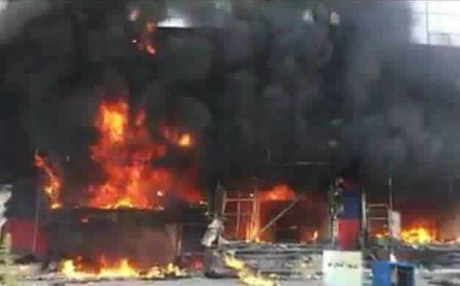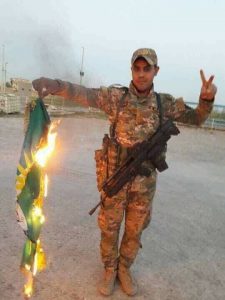Washington Kurdish Institute
November 20, 2017
Since the Kurdistan region of Iraq held its Independence Referendum on September 25, 2017, the Iraqi government has used several punishment tactics to counter the Kurds’ attempt to obtain independence. The Iraqi government, which is loyal to Iran, achieved military advances over the Kurdish Peshmerga forces when Iranian-backed Iraqi militias (i.e. Popular Mobilization Forces) accompanied by Iranian top commanders attacked the disputed areas between Baghdad and Arbil. These attacks left thousands of Kurds displaced and many civilians killed in Tuz town and Kirkuk city, all with American made weapons. Furthermore, the Iraqi government’s cabinet, led by Prime Minister Haider al Abadi, retains one of the most anti-Kurdish policies and mentalities since the era of the dictator Saddam Hussein. A day after the Kurdish Independence Referendum, the Iraqi cabinet and the Iraqi Parliament (which includes all the country’s political parties) imposed a 16-point step plan to punish the Kurdistan region. Those points included blockades on international flights and punitive legal measures.
In addition to the blockade on Kurdistan, the majority of the government/political officials and media outlets, of all Iraqi political parties (both Shia and Sunni), have started a smear campaign campaign against the Kurds and the Peshmerga forces. It seems the Shia and Sunni factions in Iraq have put aside their 1,400 year-old sectarian dispute in order to focus their attention on punishing the Kurds.
The Kurdistan region is being punished despite the fact the Kurdish leadership did not use the referendum results to declare independence.
The word “Kurdistan region” is legally recognized under Iraq’s constitution; however, similar to Saddam’s era, many individuals and organizations have begun referring to the Kurdistan region as “Northern Iraq” instead, even on official government memorandums. Another propaganda tool being utilized by these parties is to continually refer to the Kurds as “separatists,” a term that was regularly used by Saddam Hussein. In addition, there is recent evidence of numerous occassions of Iraqi security forces and militias burning Kurdish flags as well as insulting and harassing Kurdish civilians. Key Kurdish symbols and memorials have also been defaced or erased. For instance, in Kirkuk, a province where Kurdish Peshmerga forces sacrificed 600 lives and more than a thousand injured fighters in protection of the area from ISIS forces between 2014 and 2017, posters commemorating those Peshmerga forces killed have been destroyed and/or removed from the area. Social media has even become a platform for anti-Kurdish racist voices, with many Facebook and Twitter pages supporting the Iraqi government and sectarian political officials while also insulting and attacking Kurds with racially-tinged language. Kurds experience this societal and institutional racism on a daily basis, whether it be insults at security checkpoints in the Kirkuk-Baghdad route, raids of Kurdish cafes in Kirkuk, or threatening letters being sent to Kurdish residents in Baghdad.
For the Shiite ruling parties, this anti-Kurdish rhetoric serves as a perfect opportunity for them to distract from their history of bad governance since 2005. The reality for many in the Shiite-dominant provinces is a great amount of unemployment, corruption, lack of development, and nepotism.
The ruling Shiite party, Al Dawa, had three prime ministers since 2003: Ibrahim al Jaafari, Nouri Al Maliki, and the current Prime minister Haider Al Abadi. It was under Al Dawa leadership (in coordination with other Shiite parties) when sectarian war started between Shia and Sunni factions, including the organized killings of Sunni civilians in Baghdad by Shiite militias. After a decade of Sunni persecution, the fight against ISIS granted certain Iranian-backed militias in 2014 more rights to kill Sunni youth in the country. There are numerous reports about the killing of civilians by the militias and how they have become almost an everyday story in the country. Rich provinces like Basrah and Maysan suffer the highest unemployment since 2005 caused by bad governance and corruption among the political parties. Ten percent of Basra’s oil is smuggled into Iran. In addition, there is daily infighting among the Shiite parties over various government contracts.
For the Sunni political parties, the anti-Kurdish speeches are an attempt to win Sunni votes and support after these parties’ failure to deliver stability to their provinces since 2003. The Sunni towns and cities in Iraq suffer destruction and mass displacement despite the liberation of their homes. The sectarian militias prevent the Sunni population from returning to their homes in many areas including Diyala Province, the home of Iraq’s Speaker of Parliament Salim Al Jabouri. Jabouri failed to ensure the safe return of the Sunnis in his own Province, which created anger among many Sunni constituents. After the defeat of ISIS, addressing the continual persecution of the Sunnis should have been the priority for local political leaders. Instead, Jabouri and other Sunni politicians are using strong anti-Kurdish rhetoric in order to distract from their own failures.
The people of Iraq suffer from terror because of bad government policies. The entire country lives without basic services while roughly billions of dollars are wasted by corrupt politicians. Yet recently the government’s strategy for addressing these issues is to not address them at all and rather distract from these serious concerns by shifting the focus towards a rising anti-Kurdish mentality and rhetoric. This trend risks a further destabilizing and crumbling of an already disjointed country.
The Kurdish political parties, despite their divisions, have agreed to freeze the results of the Independence Referendum and respect the decision of the Iraqi Supreme Court that rejected Kurdish independence and emphasized the federal nature of Iraq. The United States and European Union welcomed the Kurdish decision and urged Baghdad to hold dialogue on this issue. However, the Iraqi government still insists on following policies straight from the playbook of the late dictator Saddam Hussein — policies of military invasion, cuts to the Kurdistan region’s budget, and the Arabization of Kurdish areas.
This anti-Kurdish rhetoric will soon get old as Iraqis begin to realize that racist rhetoric isn’t the solution for the daily problems that most Iraqi faces, which continue to go unaddressed by their politicians and leaders. For the Kurds, if Baghdad continues these policies, the Kurdish people will see no other option for rescue than independence, which will provide sanctuary for a people who have long been persecuted by the Iraqi government since the state’s creation.
Video: Iraqi Oil smuggled to Iran illegaly from southren provinces.


